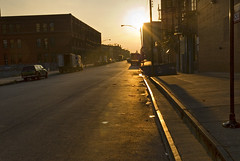As a kid in South River, Ontario, maple sugar time was a great season. Snow was melting, plenty of mud for a young boy to play in, and even all the adults in Frostpocket were acting like kids. Spring fever as we called it. Would be a real shame if global climate change irrevocably alters the rhythms of the sap flow.
Warming Trends: Warm Winters Upset Rhythms of Maple SugarFor more than 200 years, Mr. Morse’s family has been culling sweet sap from maple trees, a passion that has manifested itself not only in jug upon jug of maple syrup, but also in maple-cured bacon, maple cream and maple soap, not to mention the display of a suggestively curved tree trunk Mr. Morse calls the Venus de Maple.
But lately nature seems to be playing havoc with Mr. Morse and other maple mavens.
Warmer-than-usual winters are throwing things out of kilter, causing confusion among maple syrup producers, called sugar makers, and stoking fears for the survival of New England’s maple forests.
“We can’t rely on tradition like we used to,” said Mr. Morse, 58, who once routinely began the sugaring season by inserting taps into trees around Town Meeting Day, the first Tuesday in March, and collecting sap to boil into syrup up until about six weeks later. The maple’s biological clock is set by the timing of cold weather.
For at least 10 years some farmers have been starting sooner. But last year Mr. Morse tapped his trees in February and still missed out on so much sap that instead of producing his usual 1,000 gallons of syrup, he made only 700.
“You might be tempted to say, well that’s a bunch of baloney — global warming,” said Mr. Morse, drilling his first tap holes this season in mid-February, as snow hugged the maples and Vermont braced for a record snowfall. “But the way I feel, we get too much warm. How many winters are we going to go with Decembers turning into short-sleeve weather, before the maple trees say, ‘I don’t like it here any more?’ ”
Tags: climate_change, /Frostpocket, /global_warming

